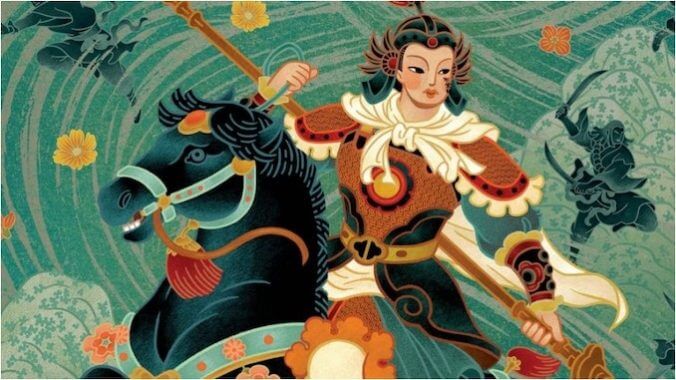Empowering the Marginalized in S.L. Huang’s The Water Outlaws

S.L. Huang’s latest novel, The Water Outlaws, garnered excitement from its announcement: it’s a retelling of the famous Chinese novel, The Water Margin (also translated into English as Outlaws of the Marsh or All Men are Brothers), with more women and genderqueer characters taking leading roles in the narrative. The Water Margin was originally written in the mid-14th century, attributed to Shi Nai’an, and tells the stories of a group of outlaws, fighting against a corrupt dynasty, who are originally pardoned to fight on behalf of the Emperor against an external threat. Huang takes that framework and focuses it into a tight narrative that really requires no knowledge of the aforementioned classic. It stands wonderfully, magically, on its own, with strong, complex characters and villains readers will love to hate.
Huang’s story begins with Lin Chong, the female Master Arms Instructor of the Imperial Guard. She’s a middle-aged woman—her children are grown and have moved away from home, leaving her somewhat on her own, dedicated to her job in Bianliang. She offers martial arts classes for other women—a hobby for the wealthier wives of the city—and here she has made friends with Lu Junyi, who hosts intellectual salons for the city’s elite artists, writers, and scientists. When Lu Junyi explains that she has a meeting with Lin Chong’s superior, Gao Qiu, in White Tiger Hall, Lin Chong is suspicious. She’s heard things about her boss, and what happens to women who meet with him alone, so in order to keep the more naive Lu Junyi safe, Lin Chong accompanies her.
Lu Junyi makes it out of her meeting safely. Lin Chong, however, faces the unwanted advances of her boss, and when she refuses, he frames her for treason and attempted assassination. Lin Chong is arrested and branded as a criminal. Lu Junyi intervenes to try to lower her sentence—Gao Qiu would clearly have her executed for embarrassing him—and sends a mutual acquaintance of hers and Lin Chong’s, Lu Da, to make sure that Lin Chong gets safely to the camp where she will serve out her sentence. But she never arrives. Instead, Lu Da has to rescue her from a more violent fate, and Lin Chong finds that her only path forward is to join the outlaws at Liangshan.
For a loyal citizen of the Empire, this is hard to swallow, and Lin Chong’s journey to accepting how things are—and how things could be—drives the majority of the novel. Other characters’ lives and stories weave in and out of the narrative. Lu Da isn’t just Lin Chong’s rescuer; she’s a criminal and former monk who possesses a God’s Tooth, an artifact that allows her to draw on mysterious divine strength to empower her own fighting. Chao Gai, a monk and demon hunter who rides the sixteen winds, lives as a woman in Liangshan and a man in the village of Dongxi, which she saved from a plague of ghosts. Song Jiang, a famous poet, has sided with the outlaws due to her own dream for what the Empire could be, if only the corrupt bureaucracy of the court were removed. An Daoquan, who speaks in sign language, serves as the outlaws’ doctor, so skilled they call her the Divine Physician. The characters are vibrant, and each feels that they have a fully fleshed story behind them, even if they appear only briefly in the main plot.
Meanwhile, Lu Junyi is pressed into service, creating a new alchemical weapon for the Chancellor of the Secretariat, Cai Jing. The old bureaucrat is determined to keep the Empire safe from the threat in the north, no matter what the cost, and no matter what others thing of his efforts. He believes he can harness the power of a God’s Tooth and control it, and he enlists Lu Junyi into his quest. For a woman who always longed to be influential, the new position both excites and frightens Lu Junyi—just as Cai Jing himself feels both like a kind mentor and like a treacherous snake. Lu Junyi’s journey, questioning what it means to uphold the Empire and to serve her country, echoes Lin Chong’s, but from the opposite side. As Lu Junyi is brought closer into the inner circle, she must look at whether supporting the status quo is the moral thing to do.
-

-

-

-

-

-

-

-

-

-

-

-

-

-

-

-

-

-

-

-

-

-

-

-

-

-

-

-

-

-

-

-

-

-

-

-

-

-

-

-








































